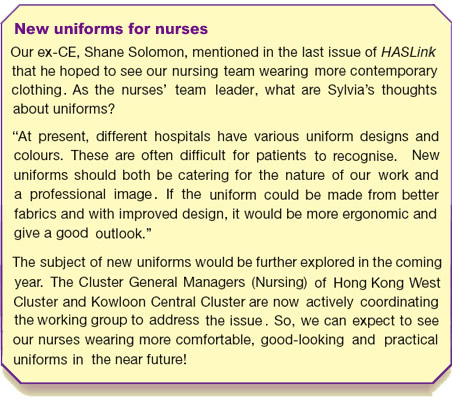|
 s Sylvia
Fung took up the post Chief Manager (Nursing) at the HA in 2008,
she told HASLink she had mixed feelings about her new responsibilities.
She felt both excited and worried. Now, after two years leading
the nursing team and facing different challenges with it, she frankly
admits that her position is full of potential uncertainties. The
most challenging problem she and her colleagues have had to tackle
is the shortage of nurses. s Sylvia
Fung took up the post Chief Manager (Nursing) at the HA in 2008,
she told HASLink she had mixed feelings about her new responsibilities.
She felt both excited and worried. Now, after two years leading
the nursing team and facing different challenges with it, she frankly
admits that her position is full of potential uncertainties. The
most challenging problem she and her colleagues have had to tackle
is the shortage of nurses.
Last year, the turnover rate of nurses in public hospitals was 4.1%. Among them, Queen Mary Hospital had the highest rate of 6.1%, the highest it has been in recent years. The situation is also volatile in other clusters.
Sylvia says she understands the growth of the private sector and the workload pressure are two reasons why some of our nursing colleagues have decided to leave the public sector. "Even though they choose to continue their nursing careers in the private sector, it means that the entire healthcare system does not lose them. However, we still need to find ways to deal with the situation lest those remain in the public system will endure greater pressure from heavier workload."
 |
|
The "Happy Ward Programme" is one of the policies and projects the HA is introducing to retain nurses. This grassroots-led pilot programme aims to harness the collective wisdom of our colleagues in order to make their working environment happier.
"The team will start by reviewing the work processes and work culture, then seek ways to create a positive working environment," Sylvia explains. "Some possible examples of this are renovating and reconstructing wards, purchasing new medical equipment, including electrical beds". She says improving facilities and patient care equipment can increase the efficiency of nurses' work and enhance their occupational safety, by reducing the risk of injuries.
|
 |
To offer nurses preferred working sites, cross-cluster staff transfer is also being facilitated. Nurses used to find it difficult to obtain approval for transfer due to staff shortage. The HA has now strengthened collaboration among all clusters to address the issue. Its goal is to satisfy such requests by matching nurses' transfers and replacement with new nurse recruits.
"Most applicants seek transfer because their workplace is far from their homes, and long travelling time increases the pressure especially with their shift duty rosters. I'm sure the programme will prove effective in addressing the needs of these colleagues, and it should be an effective means of improving staff satisfaction and retention".
|
 |
The HA intends to employ 1,100 nurses to fill vacancies and to address new programmes in this financial year. Sylvia feels that the increase in number of university nursing degree places and the re-opening of HA nursing schools will be effective to increase the supply of nurses.
Increasing demand for healthcare services is putting our frontline colleagues under escalating pressure. Sylvia has worked at the frontline for many years, and she understands the immense stress many nurses are experiencing. She shares her own stress-reduction tips with HASLink readers. "I find sleeping and watching comedy films the best ways to relieve my stress! Whenever I encounter problems at work, I find that having a good sleep or watching a humorous movie give me lots of positive energy. Of course, we need to do our best in controlling the factors that we can control and be aware of the limitations. Moreover, we need to fully prepare our competencies and resilience in order to meet future challenges of our work."
To face all these problems, Sylvia says she will continue to keep track of the needs and feelings of her frontline colleagues by maintaining close contact with them through channels such as nursing forums. She further added that "In the coming years, we shall be faced with an increasing number of new nurse graduates. I hope to build stronger foundations for them to become proficient healthcare professionals. Moreover, we need to foster the empathy skills of new nurses. The caring culture in nursing is the crux of nurse-patient relationship. The dedication and enthusiasm of our nurses will be appreciated and reciprocated by our patients and the community. I'm sure our colleagues will find satisfaction and happiness in their work." 
|
 |
|
|
|




